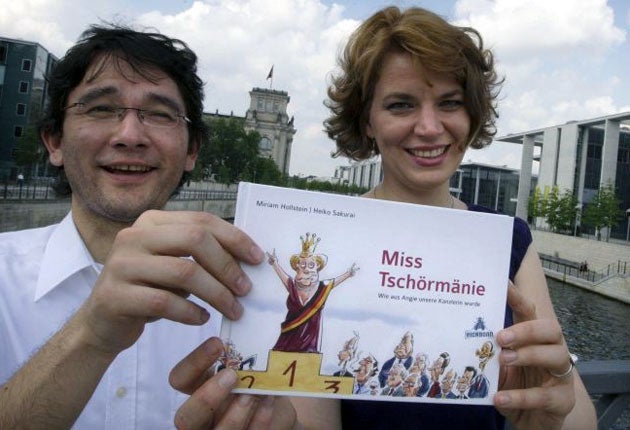And finally, Germans see the funny side of Mrs Merkel
Chancellor escapes lightly in comic biography three months before election

As a child, she was so politically chameleon-like that she didn't ride a bike. The reason: she saw no difference between left and right. Now in her fifties, she stands somewhat gormlessly on a podium, sporting a golden crown engraved with a giant "A" and celebrating her coronation as Miss Tschörmänie.
The depiction and jokes are contained in a new Angela Merkel comic biography that pokes fun at Germany's first female chancellor in pocket book form for the first time. The comic went on perfectly timed sale throughout Germany yesterday – less than three months before the general election.
While other European political leaders, most notably Gordon Brown and Nicolas Sarkozy, have been objects of merciless satire in comics ever since they were elected, it has taken Germany all of the three-and-a-half years since Ms Merkel became Chancellor to produce an equivalent.
Tschörmänie – how Angie became our Chancellor is by a journalist, Miriam Hollstein, who admitted yesterday that she was inspired to write the book after covering the 2007 French elections. "There is a very successful bio comic on Sarkozy, so I thought we could do with something similar in Germany," she said. Her biography, delivered in the form of a comic strip drawn by the cartoonist Heiko Sakurai hardly takes the gloves off. But it contains some amusing passages about Ms Merkel's childhood in former communist East Germany. "How is it possible that a baby who was taken by her mother into the Communist zone ended up being Germany's first woman chancellor?" the book asks.
Her father, a Protestant pastor, moved there in the mid-1950s from Hamburg. In the comic he is portrayed as a devout and earnest young man who insists: "We Christians must not leave the East to the Communists". And so the reader begins to understand where Ms Merkel's values have their roots.
As a toddler Angela is depicted a chubby child who does not move very much: "Even in those days she sat everything out," the book remarks. Later, when the Berlin Wall falls, she is in a sauna and misses much of the action. However that does not prevent her from rushing to West Berlin a few days later in order to eat oysters in a posh hotel with her mother. She grabs the conservative party leadership after Germany's "unification Chancellor" Helmut Kohl becomes enmeshed in a party funding scandal. She eventually outfoxes all her internal opponents and external rivals.
Most of the biography is based on fact. Critics have praised it not so much for its comic content as for its ability to explain politics. "It is an enlightening fast guide to the dynamics of political power," wrote Der Tagesspiegel.
Yet the book's release has also prompted Germany's political pundits to ask why the 54-year-old conservative leader managed to escape being satirised for so long while her predecessors, Gerhard Schröder and Helmut Kohl were routinely lampooned from the word go.
Most conclude that it was because Ms Merkel is the country's first woman leader and has therefore been afforded more respect than her male counterparts. The other factor is that her self-effacing nature and lack of visible arrogance means satirists have a difficult time making jokes.
In the run-up to Germany's September general election, Ms Merkel remains one of her country's most popular leaders on record. She has achieved her position largely as a result of foreign policy coups and through her abilities as a European Union power-broker. Despite her government's wholesale support for a car industry which produces gas-guzzling vehicles, she has managed to sell herself to the electorate as a leader with a green heart.
If last month's European polls are anything to go by, she is on course to win the German election. Her comic biography suggests it is a foregone conclusion. It begins in a Berlin bar on Election Night 2009 with Schröder enviously watching the results come in and asking: " How does she do it?"
Join our commenting forum
Join thought-provoking conversations, follow other Independent readers and see their replies
Comments